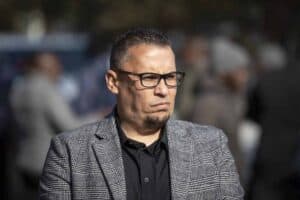Ordinary people could not tune into coverage from their preferred media houses because of pettiness from councillors, who felt like presidents.

The Joburg council sat in person for the first time since 31 August when a fire shut down the Metro Centre. The meeting was held at the Brixton Multipurpose Centre on Tuesday and Wednesday.
The ongoing water crisis set the tone, as a handful of people gathered at the venue to protest and submit a memorandum of demands to executive mayor Kabelo Gwamanda.
Some of these residents have been without water for up to three months and one instantly questions the role of the councillors and their urgency, if any, of dealing with pressing issues.
Gwamanda acknowledged the service delivery failures of the current and previous administration.
“We live in a world-class African city; however, the conditions in which residents live are contradictory to that,” he told protesters.
ALSO READ: City of Joburg council feasts on our dime
“We are committed to the restoration of services in Johannesburg that have deteriorated in the past five years. We will present our turnaround strategy.”
To me, this suggests one thing: the city does not have a grip on the water crisis.
One would have expected councillors to waste no time in passing important motions to address this and other burning issues. That was, however, not the case.
A great deal of time was spent on non-issues – including complaining about how cold the venue was and numerous caucus breaks. In one instance, as the council returned from lunch, one political party requested a 45-minute recess.
Some of them sat outside smoking, basking in the sun.
ALSO READ: Position to lead Tshwane or Joburg should not be passed around like a cheap cigarette
In between, issues affecting the people they claim to represent were being discussed. They spent more time howling at each other, though, undermining each other and continuously chatting inside the chamber, some on their cellphones – conduct which speaker Colleen Makhubele reprimanded.
In a normal council sitting, the media and the public are catered for in terms of seats and space for equipment, but because this was the first time the council had convened in this hall, everyone had to make a plan.
Some councillors even asked security to remove a municipal videographer from the chamber because “councillors were the only ones which were supposed to be there”. That meant ordinary people could not tune into coverage from their preferred media houses because of pettiness from councillors, who felt like presidents.
One of the councillors, Masindi Mmbengwa, raised the motion about alternative water solutions, which included getting water from springs around the city, and tapping underground water and water wells. However, there seemed to be no interest to debate the solutions.
With the city in crisis because of the water problem, one would think this would be a highly debated issue. But this was not the case.
ALSO READ: Minister of Finance appoints Kubheka as chairperson of Ombud Council
If the water crisis persists, it will be used by the opposition as a tool to campaign, disparaging how badly the current government is failing and how they will deal with it because they have a solution. Meanwhile, they could have dealt with it during a council sitting.
The time to debate how one party is wrong and how the other party is right is over. Councillors should be able to put their heads together and find solutions. Surely that is what their constituents elected them for?
Ultimately, residents in the so-called City of Gold will have to think long and hard about the choices they make when they head to the polls for the 2024 elections.






